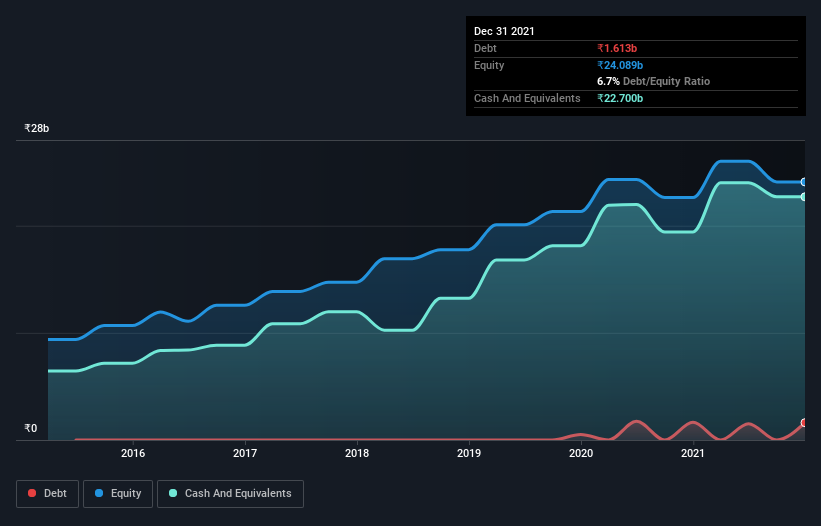We Think Abbott India (NSE:ABBOTINDIA) Can Manage Its Debt With Ease

Legendary fund manager Li Lu (who Charlie Munger backed) once said, 'The biggest investment risk is not the volatility of prices, but whether you will suffer a permanent loss of capital.' When we think about how risky a company is, we always like to look at its use of debt, since debt overload can lead to ruin. Importantly, Abbott India Limited (NSE:ABBOTINDIA) does carry debt. But is this debt a concern to shareholders?
Why Does Debt Bring Risk?
Debt and other liabilities become risky for a business when it cannot easily fulfill those obligations, either with free cash flow or by raising capital at an attractive price. Ultimately, if the company can't fulfill its legal obligations to repay debt, shareholders could walk away with nothing. However, a more usual (but still expensive) situation is where a company must dilute shareholders at a cheap share price simply to get debt under control. Of course, debt can be an important tool in businesses, particularly capital heavy businesses. The first step when considering a company's debt levels is to consider its cash and debt together.
Check out our latest analysis for Abbott India
What Is Abbott India's Net Debt?
The chart below, which you can click on for greater detail, shows that Abbott India had ₹1.61b in debt in September 2021; about the same as the year before. However, it does have ₹22.7b in cash offsetting this, leading to net cash of ₹21.1b.

How Strong Is Abbott India's Balance Sheet?
We can see from the most recent balance sheet that Abbott India had liabilities of ₹10.9b falling due within a year, and liabilities of ₹2.22b due beyond that. Offsetting these obligations, it had cash of ₹22.7b as well as receivables valued at ₹3.47b due within 12 months. So it actually has ₹13.1b more liquid assets than total liabilities.
This surplus suggests that Abbott India has a conservative balance sheet, and could probably eliminate its debt without much difficulty. Succinctly put, Abbott India boasts net cash, so it's fair to say it does not have a heavy debt load!
Also good is that Abbott India grew its EBIT at 17% over the last year, further increasing its ability to manage debt. There's no doubt that we learn most about debt from the balance sheet. But it is Abbott India's earnings that will influence how the balance sheet holds up in the future. So if you're keen to discover more about its earnings, it might be worth checking out this graph of its long term earnings trend.
Finally, while the tax-man may adore accounting profits, lenders only accept cold hard cash. While Abbott India has net cash on its balance sheet, it's still worth taking a look at its ability to convert earnings before interest and tax (EBIT) to free cash flow, to help us understand how quickly it is building (or eroding) that cash balance. Over the last three years, Abbott India recorded free cash flow worth a fulsome 82% of its EBIT, which is stronger than we'd usually expect. That positions it well to pay down debt if desirable to do so.
Summing up
While it is always sensible to investigate a company's debt, in this case Abbott India has ₹21.1b in net cash and a decent-looking balance sheet. And it impressed us with free cash flow of ₹8.9b, being 82% of its EBIT. So we don't think Abbott India's use of debt is risky. There's no doubt that we learn most about debt from the balance sheet. However, not all investment risk resides within the balance sheet - far from it. To that end, you should be aware of the 1 warning sign we've spotted with Abbott India .
If you're interested in investing in businesses that can grow profits without the burden of debt, then check out this free list of growing businesses that have net cash on the balance sheet.
New: Manage All Your Stock Portfolios in One Place
We've created the ultimate portfolio companion for stock investors, and it's free.
• Connect an unlimited number of Portfolios and see your total in one currency
• Be alerted to new Warning Signs or Risks via email or mobile
• Track the Fair Value of your stocks
Have feedback on this article? Concerned about the content? Get in touch with us directly. Alternatively, email editorial-team (at) simplywallst.com.
This article by Simply Wall St is general in nature. We provide commentary based on historical data and analyst forecasts only using an unbiased methodology and our articles are not intended to be financial advice. It does not constitute a recommendation to buy or sell any stock, and does not take account of your objectives, or your financial situation. We aim to bring you long-term focused analysis driven by fundamental data. Note that our analysis may not factor in the latest price-sensitive company announcements or qualitative material. Simply Wall St has no position in any stocks mentioned.
About NSEI:ABBOTINDIA
Flawless balance sheet with solid track record and pays a dividend.

